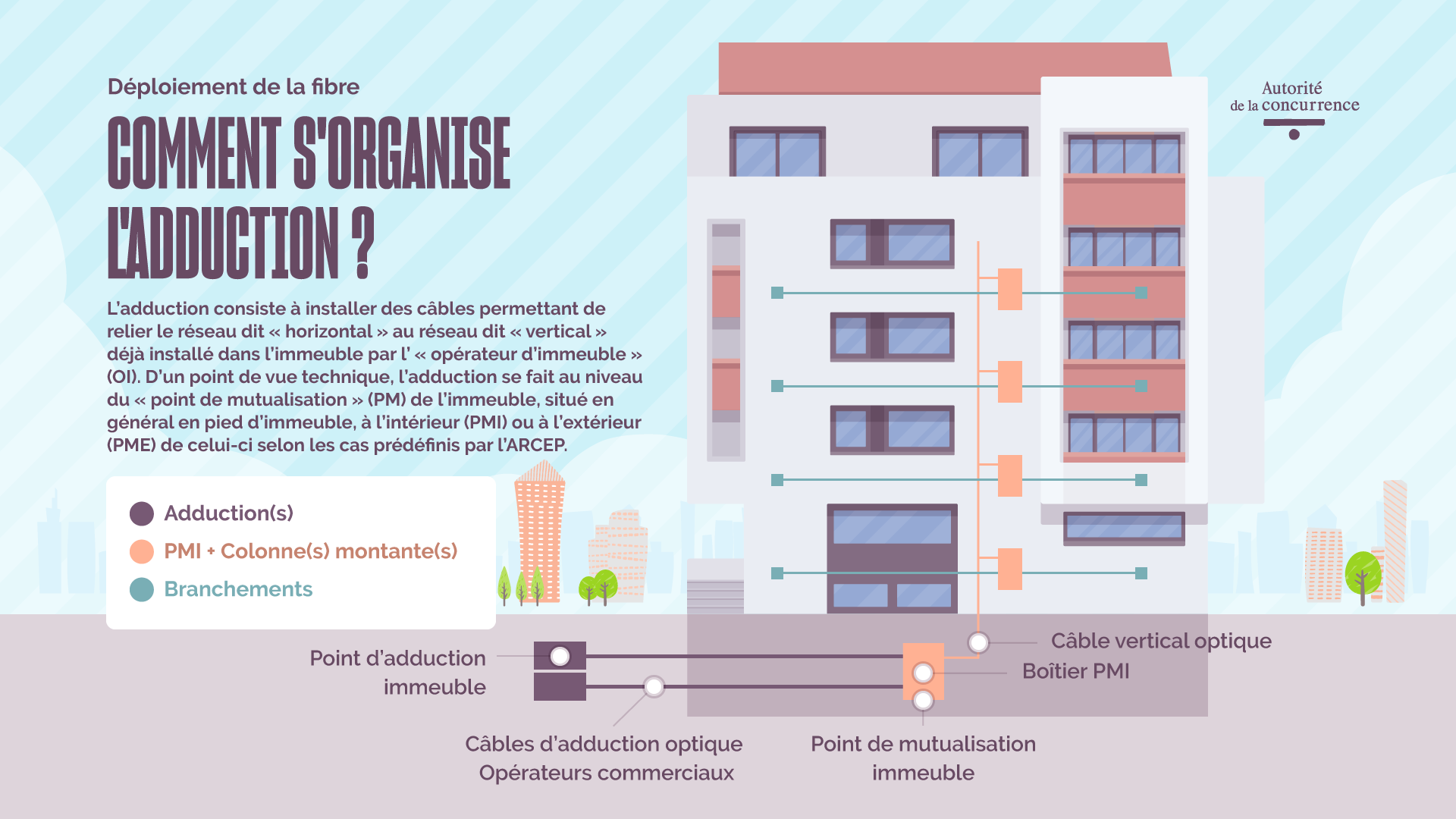Connecting buildings to the fibre optic network (Faber contract): the Autorité fines Altice 75 million euros for the clearance of penalty payments and non-compliance with injunctions issued in 2017

Background
For the record, the Autorité de la concurrence had cleared the takeover of SFR by the company Altice (at the time Numéricable) subject to structural and behavioural commitments in 2014. Subsequently, the Autorité fined Altice for not having implemented the commitments it had undertaken and handed out a 40 million euros fine along by several injunctions, some of which were subject to penalty payments in 2017.
The Autorité today issues a decision in which it clears the penalty payments imposed in its 2017 decision and fines Altice for not having properly complied with the Autorité's injunctions within the deadline.
Altice requested the benefit of the settlement procedure. As part of this negotiated procedure, the Autorité handed out a fine worth 75 million euros.
This is the Autorité’s first decision on the clearance of penalty payments on the basis of Article L. 430-8 of the Commercial Code.
The decision to clear the takeover of SFR by Altice and the risks then identified with regard to the continued deployment of optical fibre
The takeover of SFR by Altice was cleared by the Autorité de la concurrence in October 2014 (decision 14-DCC-160 of 30 October 2014) subject to several commitments (see the press release of 27 October 2014) to prevent identified risks of harm to competition. In particular, the Autorité considered that the transaction was likely to call into question the new entity's incentive to honour its contractual obligations in terms of fibre deployment, particularly vis-à-vis Bouygues Telecom.
Indeed, Bouygues Telecom signed a co-investment agreement with SFR in November 2010, known as the “Faber contract”, relating to the deployment of a horizontal fibre optic network in 22 municipalities located in very dense areas. However, given the very high coverage rate of the cable network in very dense areas, SFR would have had little interest in continuing the deployment (most of the FttH sockets that SFR planned to deploy in very dense areas having become redundant with Numericable's cable network after the transaction).
To remedy this competition issue, Altice had undertaken, on the one hand, to continue the development of fibre within the geographical scope of the Faber contract, by proceeding with the addition of concentration points within a constrained timetable, and on the other hand, to guarantee the maintenance of the network in a transparent and non-discriminatory way.

In practice, the connection consists in installing cables (in purple in the diagram) making it possible to connect the so-called "horizontal" network to the so-called "vertical" network (shown in orange in the diagram) already installed in the building by the "building operator”. From a technical point of view, the connection is done at the level of the "concentration point" of the building, generally located at the foot of the building, inside or outside of the latter according to the cases predefined by ARCEP.
The decision on non-compliance with the commitments made in 2017
In its 2017 decision (17-D-04 of 8 March 2017/see press release), the Autorité found that Altice had not complied with its commitments made in 2014 vis-à-vis Bouygues Telecom: the rhythm of the connections had slowed down considerably after the completion of the transaction, and had only really resumed after a year, generating a substantial delay in relation to the commitments made. In addition, this failure was accompanied by a deterioration in network maintenance conditions, which penalised Bouygues Telecom.
The Autorité then handed out a 40 million euros fine, as well as several injunctions to ensure that Altice refrains from continuing these behaviours. In particular, it set Altice a new implementation schedule comprising stages of completion, some of which were accompanied by progressive penalties, in order to compel it to proceed with the supply of all concentration points which were not actually supplied. The Autorité also ordered Altice to respect the maintenance of the network covered by the Faber contract.
In this decision, the Autorité finds that Altice has not properly executed the injunctions and proceeds, for the first time, to a clearing of penalty payments
The Autorité notes that despite "the performance obligation" incumbent on Altice, the company has not, within the deadline, complied with the injunctions.
Thus, with regard to injunctions under penalty payments, the Autorité notes that the number of connections carried out by Altice remains very far from the levels of achievement that it had set in its decision. The Autorité also considers that, to a significant extent, the cases of non-performance were not linked to the external difficulties alleged by Altice and that in this respect the latter had not provided proof of a difficulty that had arisen which would not be attributable to him.
With regard to the maintenance injunction, the Autorité considers that Altice has not achieved the objective assigned to it and this throughout the period considered, even though it notes an improvement over the last quarter.
As part of the investigation led by the Autorité, Altice requested the benefit of the settlement procedure. This procedure allows a company that does not challenge the allegations brought against it to obtain a financial penalty within a range proposed by the General Rapporteur and agreed by the parties.
Altice did not dispute the reality of these breaches and signed a settlement report on 11 May 2022.
Given all of these elements, the Autorité fined Altice 75 million euros for the clearance of the penalty payments and the financial penalty imposed for non-compliance with certain injunctions.
Finally, at Altice's request, the Autorité lifted the injunctions subject to penalty payments issued by decision 17-D-04 of 8 March 2017, considering that, for the future, their maintenance was not justified. It indeed noted that Altice has gradually approached, over the recent period, the objective set for it by the injunctions and that the number of concentration points remaining to be connected was henceforth residual. In addition, it notes in its decision that the Faber contract was the subject in 2018 of an amendment between the parties, which is inspired by the injunctions issued by the Autorité.
Previous decisions
- 30 October 2014 (Decision 14 DCC 160/See the press release): The Autorité cleared the exclusive acquisition of SFR by the Altice group, subject to structural and behavioural commitments
-
19 April 2016 (Decision 16‑D‑07/ See the press release): The Autorité fined the Altice group €15 million for failing to honour certain commitments related to the divestiture of the mobile telephone business of Outremer Telecom, pursuant to Decision 14-DCC-160.
-
8 November 2016 (Decision no. 16-D-24/See the press release): The Autorité fined the Altice group €80 million for the premature completion of two transactions notified in 2014, including the transaction cleared by Decision 14-DCC-160.
-
8 March 2017 (Decision 17‑D‑04/See the press release): The Autorité fined the Altice group €40 million for failing to honour its commitments related to the “Faber” agreement, pursuant to Decision 14-DCC-160. It also ordered several injunctions, including some with penalty payments.
-
28 October 2019 (Decision 19-DCC-199/See press release): The Autorité de la concurrence does not renew the commitments undertaken by Altice when it acquired SFR. On the other hand, the injunctions subject to penalty payments issued by the Autorité in 2017 concerning the co-deployment agreement for the fibre optic network concluded with Bouygues Telecom (“Faber” agreement) are maintained.
Decision 22-D-15 of 29 September 2022
Contact(s)
